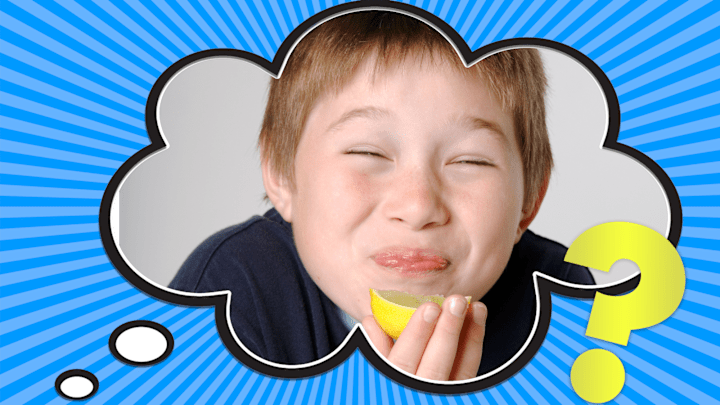When you eat something really sour, the sensation isn't limited to your tongue. An especially tart bite has a way of making your entire face contract into a scrunched-up look of discomfort. If you can't resist puckering your mouth when you lick a lemon or snack on Sour Patch Kids, you can thank evolution.
That unmistakeable sour flavor that prickles you tastebuds is a product of the hydrogen ions that acids release when they combine with saliva. When your mouth detects this sign of acid, it lets you know in a dramatic way. Your taste receptors light up and your face twists involuntarily in what's known as a rejection response, according to Live Science.
Your tongue's reactions to bitter or spicy foods are rejection responses as well. Many plants found in nature with these flavors are poisonous, and your body's strong reaction is its way of protecting you from harm. Sourness shows up naturally in fruits like citrus, but it can be a warning of food-borne illness in many cases. Spoiled fruits and dairy products contain acid, which gives them a sour taste too.
It's hard to ignore the sour flavor of what you're eating when it contorts your entire facial expression. This reaction isn't necessarily enough to help someone who already taken a bite of a bad apple, but it may protect the people they're with. When our early human ancestors foraged for food, a sudden grimace may have communicated that whatever that person put in their mouth wasn't good to eat.
The pucker response to sour flavors helped early humans avoid getting sick, but it doesn't stop us from eating sour foods today. The flavor is so sought after that there's an entire candy market devoted to maximizing it in processed products. So why do we love to eat the very thing that our face and tongue warns us might kill us?
The answer is acquired taste. Humans don't innately crave bitter, spicy, or sour foods, but foods with these characteristics are important components of a nutritious diet. Instead of loving these flavors from birth, we're conditioned to enjoy them through repeated exposure. By becoming acquainted with the taste via our peers and family members, humans gradually learn which sour (and bitter and spicy) foods are healthy and which are potentially harmful.
Though we rely on the sense everyday, taste doesn't work exactly how you may assume. Here are some fascinating facts about the sense of taste to chew on.
[h/t Live Science]
